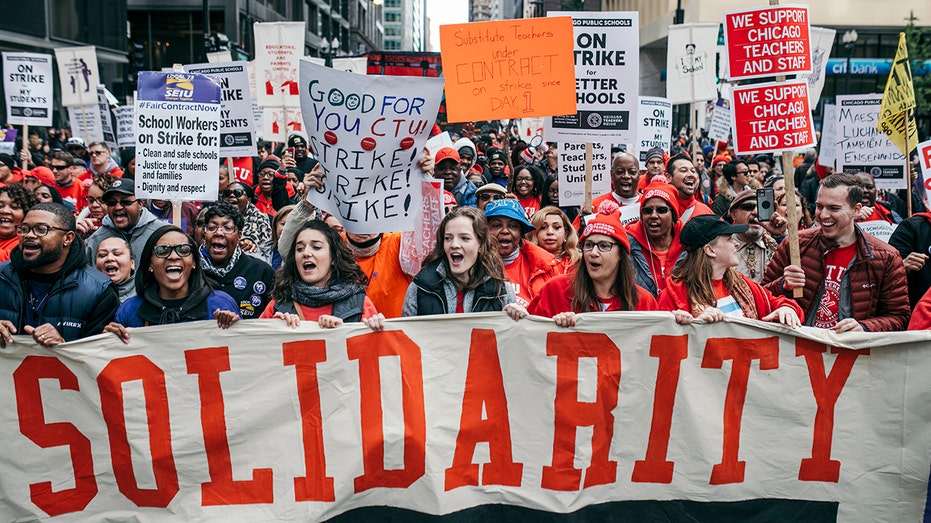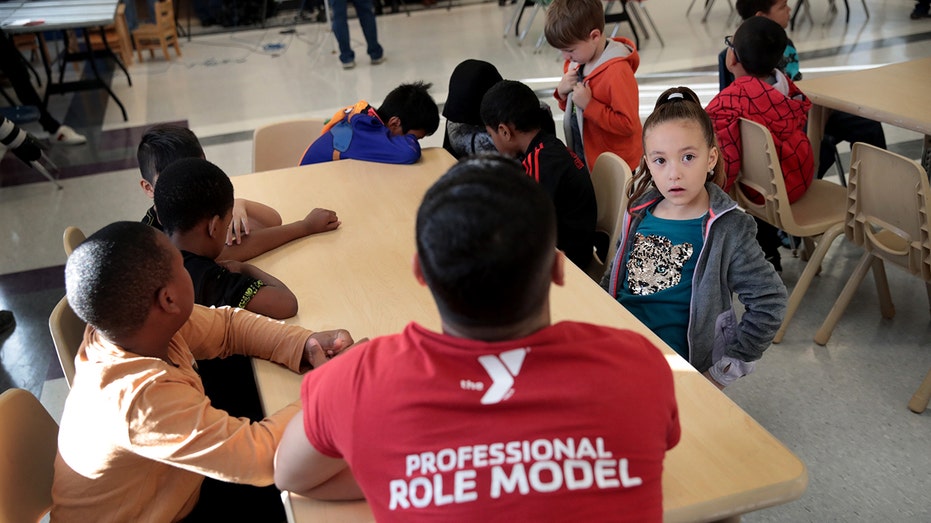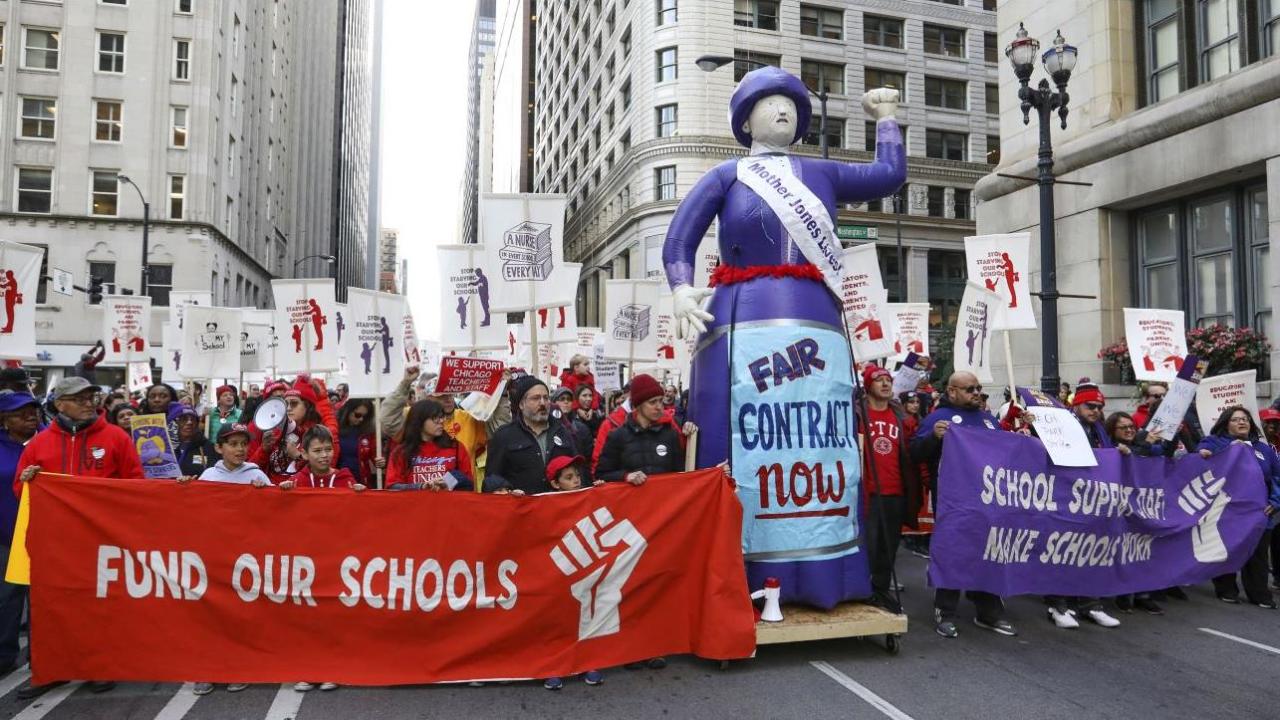CEI's Trey Kovacs: Chicago teachers strike -- What benefits the union vs what benefits teachers and students
For the second time in less than a decade, the Chicago Teachers Union (CTU) decided to go on strike. Since Thursday, the Chicago Public School District, the third-largest school district in the nation, has been forced to cancel classes for more than 300,000 kids, sidelining their education and sending parents into a scramble to cover the unexpected home time.
Chicago Mayor Lori Lightfoot’s administration has indicated both sides are far from ratifying a contract.
In a contract proposal that the union rejected, the mayor offered a 16 percent pay raise over five years. But the CTU demands a 15 percent raise over three years.
“We can’t bargain with ourselves,” Lightfoot told reporters last week.

Striking Chicago public school teachers and their supporters march through the Loop on October 17, 2019 in Chicago, Illinois. About 25,000 Chicago school teachers went on strike today after the Chicago Teachers Union (CTU) failed to reach a contract
Picketing teachers told reporters last week that the walkout was about getting more resources for students, and not about getting a raise.
But, despite the fact that Illinois law prohibits union strikes over “non-economic” issues, those are also sticking points in negotiations: class-size and a demand that the school district agree to hire more support staff like nurses, social workers and librarians.
As the Chicago Tribune reported, Mayor Lightfoot already agreed to “spend $3 million to reduce class sizes in fourth through 12th grade classrooms. And, the city has offered to double the number of social workers and nurses.”
But the real question is whether the taxpayers of Chicago can even afford such lavish concessions from the mayor. They’re already paying quite a bit in taxes.
An Illinois Policy Institute analysis of 24 different taxes and fees finds that Chicago ranked No. 1 on 10 of the tax and fee rates. Of those 24 different taxes, Chicago ranked no lower than No. 14 in any category, ranking No. 1 in sales tax rates, No. 6 in property tax and No. 9 in gas tax.

CHICAGO, ILLINOIS - OCTOBER 17: Students affected by the teachers' strike attend a program at the McCormick YMCA on October 17, 2019 in Chicago, Illinois. About 25,000 Chicago school teachers went on strike today after the Chicago Teachers Union (CTU
Compounding the problem, the state of Illinois fails at spending education funds effectively. On average, Illinois school districts spent $20,826 per student for 2016-17, according to the Illinois State Board of Education.
Other large school districts spend considerably less. For example, according to 2017 Census data, Fairfax County, Virginia -- the 13th largest school system in the U.S., according to World Atlas -- only spends $14,498 per student and Montgomery County, Maryland -- the 14th largest school system in the U.S. -- spends $16,109 per pupil.
Instead of just adding to the tab via teacher raises and new hires, Illinois and the City of Chicago need to examine how they spend tax dollars and reallocate more resources to actually educating students.
And Illinois leads the nation in school administration spending, at more than $1 billion, a report from the Metropolitan Planning Council finds. Instead of just adding to the tab via teacher raises and new hires, Illinois and the City of Chicago need to examine how they spend tax dollars and reallocate more resources to actually educating students.
The public conversation and debate should focus more on what contract provisions solely benefit the union versus what benefits teachers and students.
For example, part of the mayor’s contract offer would require the Chicago Board of Education to provide the union with all current employees’ private information.
The list is exhaustive, including employees’ name, job title, department, work location, home address, all telephone numbers, personal and work email, salary, date of birth, identification number, status as a member or non-union member and whether they pay union dues and payments to the union’s political arm. Worse, workers have no right to opt out of that information sharing.
CTU obviously demands this information so it can know which employees are full-fledged union members or not, and then use the non-members personal information to press them into joining the union and paying dues. Information on teachers who are non-members is of the utmost importance to government unions now that the U.S. Supreme Court issued a decision that non-union members can no longer be forced to pay dues as a condition of employment.
Union demands with respect to class size should also get more scrutiny. One contract provision grants all CTU delegates — a variety of teachers, nurses and other Chicago public school employees — a free period every month to conduct union business paid by the taxpayer. On the CTU website, it appears there is upwards of 800 such delegates.
In addition, teachers and other employees elected to senior positions at the CTU can be granted “leaves of absence for union business” for the school year. Chicago public schools do not pay their salaries while on union business leave, but there’s a real taxpayer cost: those workers continue to accrue seniority, health and pension benefits, and may return to their original public employment after their term.
Needless to say, taxpayers should not be on the hook for public employees conducting union business. As the city of Chicago and the CTU continue to negotiate, hopefully someone from the city calls for scrapping provisions that endanger workers’ privacy and exclusively benefit the union.
GET FOX BUSINESS ON THE GO BY CLICKING HERE
After all, labor unions are formed to promote the interests of their members, not agree to contracts that serve the interests of its leaders.
Trey Kovacs is a labor policy analyst for the Competitive Enterprise Institute, a free market public policy organization based in Washington, D.C.




















